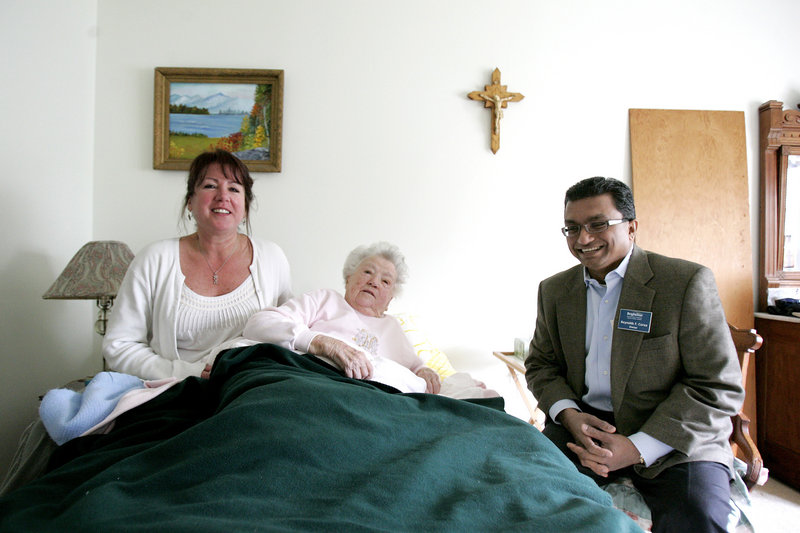PHILADELPHIA — Many would argue that fried chicken has nothing to do with health care. Reynolds Corea would beg to differ.
He’s a former outsourcing expert who was making “easily” six figures, Corea said, when Accenture Ltd. cut him loose in January 2009 after nearly 20 years.
“They called it rightsizing — they had all sorts of euphemisms for it,” recalled the 50-year-old father of two college students. “But it was a layoff.”
A layoff that has led Corea where so many corporate refugees have opted to go for a second career act: operating a franchise business.
The franchise market is growing at an annual rate of 2 percent, said John A. Pearce II, endowed chairman of strategic management and entrepreneurship at Villanova’s School of Business.
“While that’s not where all the action is, certainly there is a lot of vitality,” Pearce said.
Part of the appeal of franchise ownership is the range of opportunity it offers, said Brian O’Keefe of O’Keefe Franchise Advisors LLC, a Boston consultant. The estimated 825,000 U.S. franchise businesses stretch far beyond sandwiches, coffee and doughnuts to include such specialties as tax preparation, automobile care, home inspection, and paving.
O’Keefe said his typical client “always had this longing or desire to be a business owner. They see that franchising is a great way to enter into business ownership with less risk.”
As Pearce put it: “You are accepting someone else’s business model, their public image, their cost structure, and you are agreeing by and large to follow their policy manual quite rigidly. That arrangement can be a source of great comfort.”
Indeed, it was the idea of being his own boss while following someone else’s game plan that hooked Corea. That came after a period of introspection during some Accenture-sponsored outplacement counseling. From it, Corea concluded two things:
• “I did not want to report to anyone else, because in corporate America … it is that ‘what-have-you-done-for-me-lately’ culture now.”
• “Whichever organization I joined, it had to be the right culture, where I could run my own show — with certain guidelines.”
While working out on a treadmill during that period of unemployment, Corea would listen to audio books. One of them, “Loyalty Rules” by Frederick F. Reichheld, set him on the road to franchise ownership.
What he wanted was a business that involved matching the right people with those in need. O’Keefe, the consultant, eventually led Corea to BrightStar, a predominantly home-health-care chain that started in 2002 as a local business run by two Chicagoans who left corporate jobs when their search for in-home care for a relative turned up horrifying results.
They sold their first private-duty home-care and medical-staffing franchise in 2006, said BrightStar President Chuck Bailey.
Open for business just since January, Corea’s BrightStar of West Chester, Pa., franchise is providing two clients with nonmedical in-home care, such as bathing them, reading to them, and helping them get around.
Corea is not ready to offer medical services but expects to be within a year at rates he acknowledges will not be the lowest in the market. Bailey said BrightStar prices were usually $1 to $2 an hour higher than average “so we can pass that back to employees.” Its caregivers are usually paid about 10 percent more than the industry average, he said.
That’s all part of ensuring the quality service for which Corea wants his new venture to be known.
“It’s more than just sending a warm body,” he said of his company’s mission. “If our caregivers don’t care in addition to providing a service, then we have failed.”
It’s a “daunting” undertaking, Corea acknowledged, but one made less overwhelming because he is part of a franchise rather than a stand-alone start-up.
“I’m out here scurrying around trying to build a business,” he said. “I need someone to worry about what’s next.”SMALL BUSINESS IS BIG
THOUGH small businesses, franchises account for some sizable economic statistics — nearly 18 million jobs and $1.2 trillion in gross domestic product, according to the International Franchise Association in Washington. The group attributes one out of eight nonfarm, private-sector U.S. jobs to franchise businesses.
Copy the Story Link
Send questions/comments to the editors.



Success. Please wait for the page to reload. If the page does not reload within 5 seconds, please refresh the page.
Enter your email and password to access comments.
Hi, to comment on stories you must . This profile is in addition to your subscription and website login.
Already have a commenting profile? .
Invalid username/password.
Please check your email to confirm and complete your registration.
Only subscribers are eligible to post comments. Please subscribe or login first for digital access. Here’s why.
Use the form below to reset your password. When you've submitted your account email, we will send an email with a reset code.